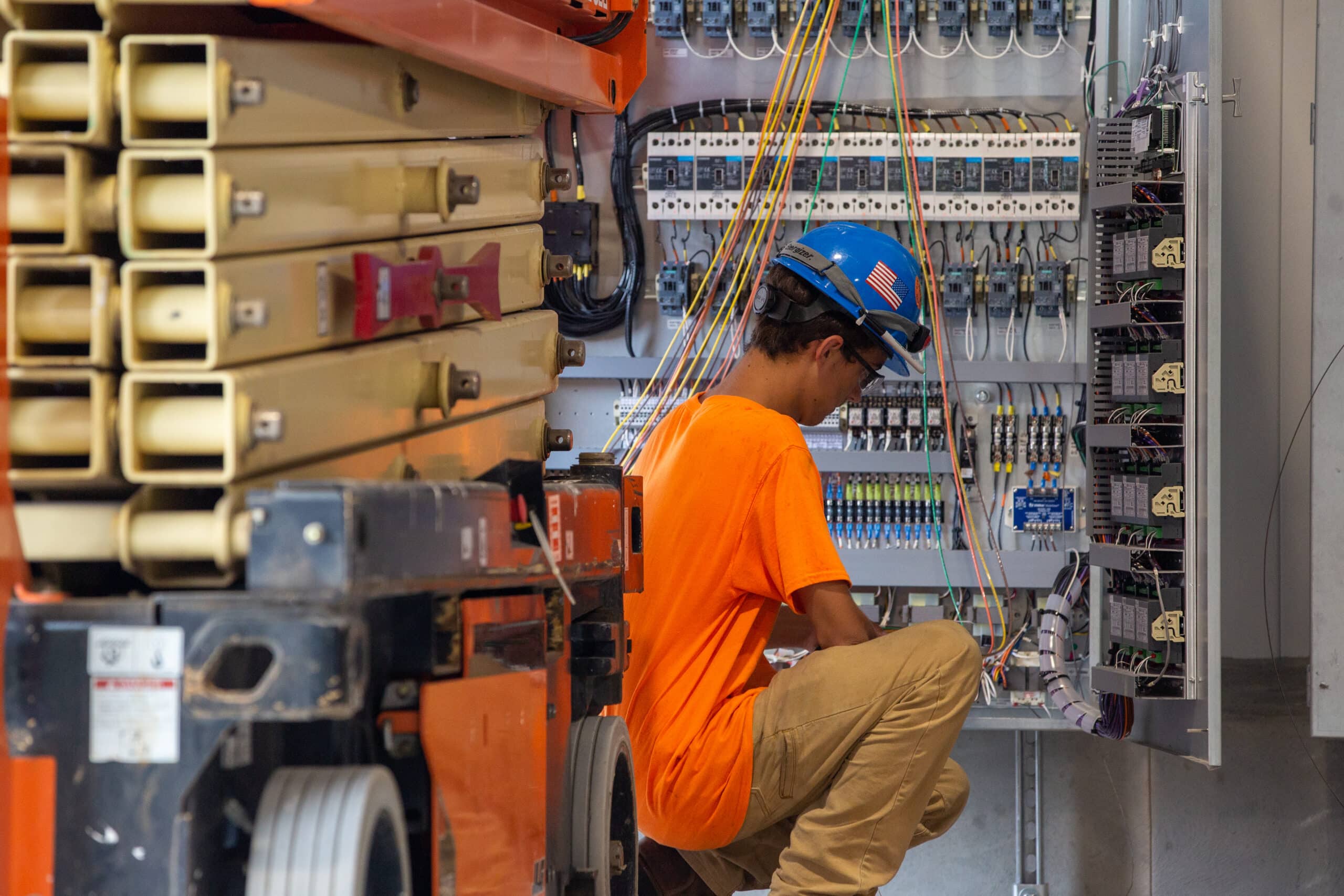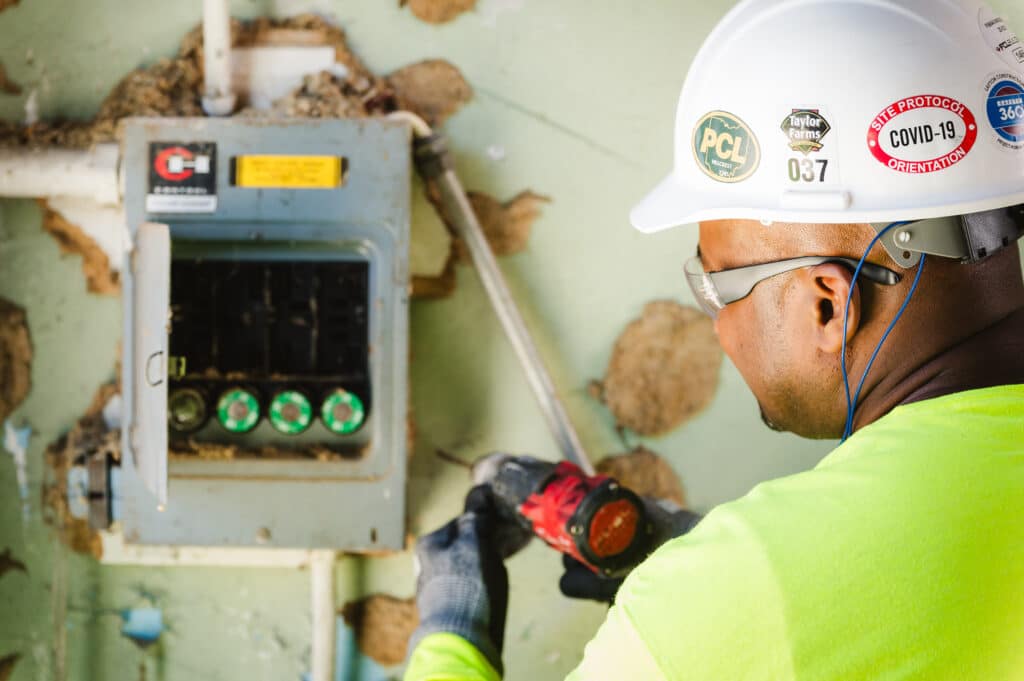
Skills Needed to Be an Electrician
Electricians play a critical role in construction by installing and maintaining electrical equipment throughout countless industries and residential settings. Whether it’s troubleshooting electrical problems or designing complex wiring systems, an electrician is a construction job that must possess a unique set of skills that are vital for ensuring the safe and efficient distribution of electricity. Mastering these skills is the gateway to a rewarding construction career in electrical systems.
In this article, we will delve further into the core skills needed to be an electrician and explore how valuable this construction job is. Whether you’re considering a career in electrical services or searching for the perfect candidate to fill your electrician job opening, this guide can help you understand the key characteristics of a successful electrician jobseeker and which skills are required to excel in this dynamic field.

Electrician Duties and Responsibilities
Many employers value hands-on experience in the electrical industry very highly, as real experience indicates practical skills and the ability to handle diverse challenges in the field. Apprenticeships and on-the-job training programs offer aspiring electricians opportunities to gain valuable experience and refine their skills under the guidance of experienced professionals.
Crafting an impressive electrician resume requires you to highlight the right skills. Employers usually seek out candidates who not only possess a solid understanding of electrical principles but can also apply them in various work environments. Furthermore, showcasing adequate experience in electrical installation or repair work is often crucial for securing a job as an electrician.
The duties and responsibilities of a maintenance electrician encompass a wide range of tasks. From interpreting blueprints and schematics to installing and repairing electrical systems, electricians must possess a strong knowledge in many areas of electrical work.
Electricians are responsible for inspecting and testing electrical equipment, identifying faults, and making any necessary repairs or replacements. Moreover, electricians must be skilled in analyzing complex electrical problems and providing effective solutions to ensure optimal performance.
Keep in mind, the typical electrician job salary varies depending on factors such as experience, location, and specialization. However, electrician salary is generally quite competitive, and electricians can expect their earnings to rise as they gain more experience and expertise.
List Of Basic Electrical Skills
To succeed as an electrician, it’s essential to possess a strong foundation of basic electrical skills. This list forms the backbone of any electrician’s skills and abilities, enabling them to perform their core duties efficiently and safely.
Electrical Technician Skills List
- Electrical circuitry: Understanding the principles of electrical circuits and being able to read and interpret circuit diagrams is crucial for all electricians.
- Wiring installation: Installing electrical wiring systems, including knowledge of wire types, sizes, and proper insulation techniques, is another essential electrician skill.
- Electrical safety: Adherence to safety protocols and regulations, such as using the appropriate personal protective equipment (PPE), is of the utmost importance for electricians.
- Troubleshooting: Identifying and diagnosing electrical issues using tools like multimeters and circuit testers is also a crucial skill for electricians.
- Electrical codes and regulations: Familiarity with local and national electrical codes and regulations is vital to help electricians always remain safe and compliant in their work.
When crafting your electrician skills resume or summary, be sure to highlight these crucial electrician hard skills. By honing and showcasing these basic electrical skills, any aspiring electrician can lay a solid foundation for their career and increase their employability in the electrical field.
Skills In Electrical Installation And Maintenance
In addition to the core hard skills for electricians, there are other soft skills for electricians that contribute to the success of an electrical career. These skills encompass a combination of interpersonal abilities, problem-solving capabilities, and other less technical skills.
- Attention to detail: A keen eye is often crucial when working with intricate electrical systems.
- Time management: Efficiently managing tasks and adhering to project deadlines is essential to ensure timely completion of electrical installations and maintenance work.
- Problem-solving: Electricians frequently encounter complex electrical issues that require critical thinking to solve. The ability to analyze situations and identify creative solutions is invaluable in the electrical industry.
- Adaptability: Electricians often encounter unexpected challenges on the job. Being adaptable allows them to quickly assess and respond to changing situations.
- Documentation and reporting: Keeping accurate records of work and preparing detailed reports are essential for maintaining effective communication and compliance as an electrician.
To select the right electrical skills for resumes in the electrical industry, it’s important to highlight soft skills in addition to the technical skills required for electrical installation and maintenance. While technical skills are essential, possessing a well-rounded electrician skillset that includes interpersonal and problem-solving abilities is vital for success in the field. Providing specific examples of how you have applied these skills in your work experience can greatly enhance your resume’s impact.
Electrical Training Topics
Electrical training topics may cover a wide range of essential subjects with which electrics must be familiar. Here are some of the most important training topics for electricians:
- Electrical Safety: Understanding and implementing safety protocols, including proper handling of electrical equipment and use of personal protective equipment (PPE), is essential for electricians.
- Electrical Theory: All electricians need to build a strong foundation in electrical principles such as voltage, current, resistance, and Ohm’s law.
- Electrical Circuits and Wiring: Learning about different types of circuits, circuit components, and wiring systems can be very beneficial for electricians.
- Electrical Equipment and Tools: Knowledge of various electrical equipment such as meters, testers, and power tools is also critical training for electricians.
Basic electrical training courses are extremely valuable for electricians. Skills training is perhaps the best way for aspiring and experienced electricians alike to enhance their competence, access opportunities for career advancement, ensure up-to-date industry compliance, and more.
Level Of Electrical Skills
Electrical skills can generally be categorized into three different levels. These levels are based on the complexity of the task and the expertise required.
1. Entry-Level Electrical Skills
Entry-level electrical skills involve foundational knowledge and basic tasks. This level typically includes tasks like wire stripping, basic circuit installation, and routine maintenance. Jobs such as electrical helper or apprentice positions usually require entry-level skills and provide opportunities for skill development.
2. Journeyman Electrical Skills
Journeyman-level electrical skills involve a higher level of proficiency and electrician work experience. Skills at this level include more complex tasks, such as advanced circuit installation, troubleshooting, and equipment repair. Journeyman electricians may work independently or may supervise less experienced electricians.
3. Master Electrical Skills
Master-level electrical skills possess the highest level of electrical experience and expertise. Master-level skills require advanced knowledge of electrical systems, codes, and regulations. Master electricians are able to handle intricate tasks like designing electrical systems and overseeing large-scale projects.
Other Resources:
Connect with a Recruiter – Submit your Resume Here
Click Here to Meet the NCW Team
